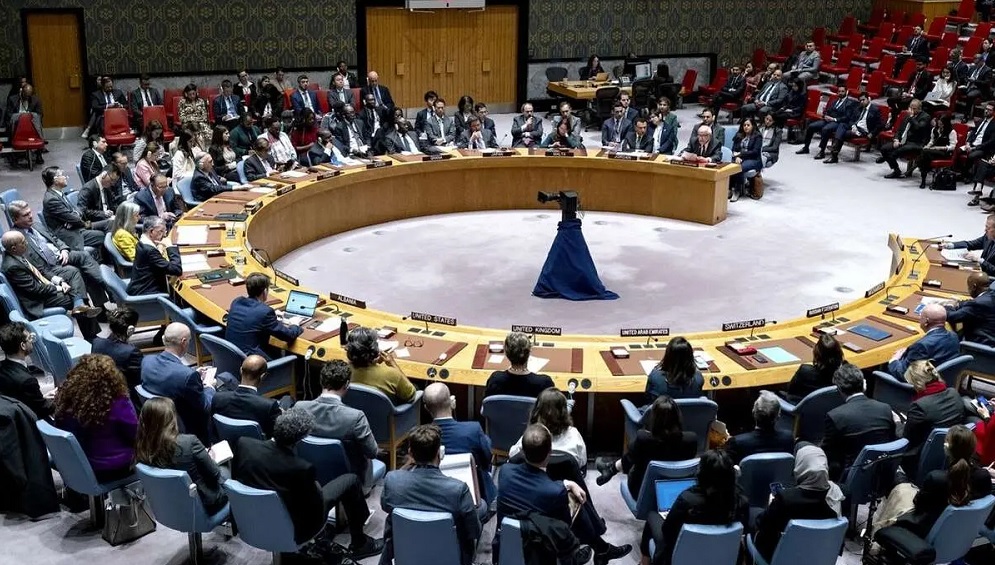Alwaght- On Friday, the United Nations Security Council declined to pass a draft resolution calling for permanent suspension of the sanctions on Iran, though Tehran and the three European powers still have eight days to work out a deal to postpone the sanctions.
Four countries voted for the suspension while nine other voters against it, a process meaning that the Europeans sanctions will reinstated on September 28.
Russia, China, Pakistan, and Algeria voted in favor of the resolution, but nine others led by the US voted against. Two abstained from voting. The voting followed a 30-day process.
What sanctions will be reinstated?
The reinstatement of sanctions on Iran will occur through a process known as snapback. This process means the immediate revival of six previous UN Security Council resolutions (from 1696 in 2006 to 2231 in 2015) and includes extensive bans on uranium enrichment, arms trade, financial activities, and shipping related to Iran.
Unlike unilateral US sanctions, these sanctions are binding for all 193 UN member states, and their enforcement is the responsibility of the UN Security Council Sanctions Committee, which will update the list of sanctioned individuals and entities.
At the same time, the return of UN sanctions is a gradual wave: first, the freezing of related assets, then trade restrictions, and finally, the monitoring of banking transactions.
However, it is important to note that no new sanctions will be added against Iran in this snapback process; instead, the previous UN sanctions that were in place before 2015 will be reactivated.
Europe's mistake
The process to reimpose United Nations sanctions on Iran was initiated by the three European parties to the JCPOA (Joint Comprehensive Plan of Action), as the US is no longer a participant in the nuclear agreement. The reinstatement of sanctions was formally triggered by these three European countries.
The French Foreign Minister Jean-Noël Barrow had earlier stated that if no agreement were reached with Iran on its nuclear program by the end of August, the European trio would move to restore international sanctions against Iran at the UN Security Council.
This development comes at a time when Iran had presented its proposals for cooperation with the International Atomic Energy Agency (IAEA) to the three European countries. Additionally, last week, Tehran and the IAEA signed an agreement in Cairo, Egypt, launching a new phase of collaboration. Despite this renewed cooperation between Iran and the IAEA, the three European countries proceeded to initiate the reinstatement of sanctions—a move that appears largely politically-motivated and highlights the prioritization of political over technical considerations in Iran's nuclear case.
Many analysts also believe that the reinstatement of sanctions against Iran lacks legal basis. Furthermore, certain technical and anti-diplomatic actions by European countries could significantly alter and restrict the future of Iran-Europe relations.
On another note, the European countries moved to reinstate sanctions against Iran while having failed to fulfill their own commitments under the nuclear agreement to normalize trade relations with Iran—especially after the US withdrawal from the 2015 deal and the reimposition of sanctions. Following the US exit from the agreement and after enduring American sanctions for a year and a half, Iran announced that, in accordance with article 36 of the JCPOA, it would cease implementing several voluntary commitments under the deal in a series of specified steps. Increasing uranium enrichment capacity was one of the retaliatory measures Iran adopted. However, Tehran stated that it was prepared to reverse these measures and resume compliance if all original parties returned to their obligations and sanctions were lifted—a scenario that did not materialize even under the previous US administration led by President Joe Biden.
Last week, diplomatic sources told Al Mayadeen that European countries show no independence in their positions toward Iran during negotiations. These sources added that "although the Cairo agreement fulfilled a significant portion of European demands, they have recently begun introducing new conditions in their communications." This report indicates that Europe's anti-Iranian actions are influenced by external actors, including pressure from Washington.
Economic ramifications of the reinstatement of sanctions
Many experts agree that European sanctions against Iran have never been able to exert the same level of economic pressure as American measures. The US sanctions, due to their wide range and extraterritorial nature, have severely disrupted Iran's access to the global banking system, oil sales, and even foreign currency transfers. In contrast, Europe has primarily focused on targeted "smart sanctions."
For instance, while companies in the energy and industrial sectors face EU restrictions, they have often found ways to maintain cooperation. Furthermore, humanitarian exemptions have left a channel open for the delivery of medicine and medical supplies. Therefore, the reinstatement of UN sanctions via the European route is expected to have a more limited economic impact on the daily lives of Iranians compared to the heavy-weight sanctions imposed by the US.
On another note, the Iranian market has lived with the factor of "expectation" for years. Each time news of negotiations or an agreement emerges, prices stabilize. Conversely, whenever new sanctions are discussed, the market goes into shock, and a similar pattern is repeating itself now. In reality, the return of sanctions is likely to have more of a psychological impact than a tangible effect on Iran's economy.
If this psychological factor can be neutralized, the practical effects of the sanctions' return may not be transformative or massively disruptive. Iran's economy has years of experience running under sanctions, and many commercial sectors have learned to function in the shadow of, and even effectively circumvent, these restrictions.



























